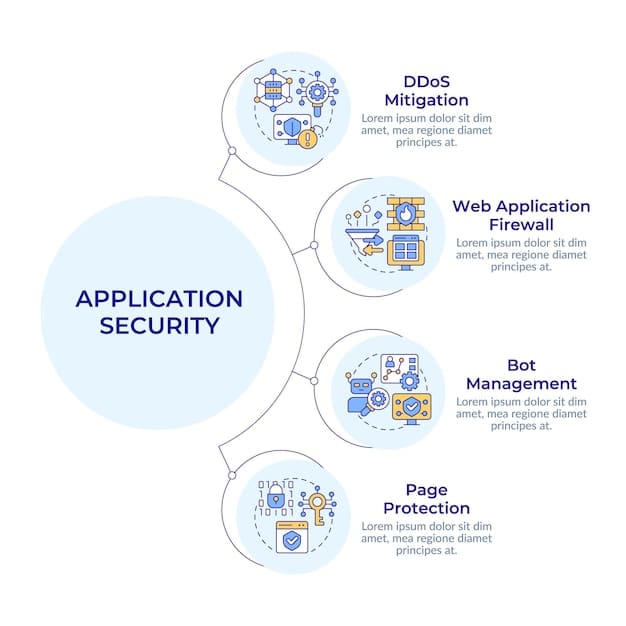US AI Policy’s 2025 Impact on Startup Innovation Explained

The updated US AI policy in 2025 is poised to significantly shape startup innovation by balancing national security with economic competitiveness, potentially fostering responsible development while also introducing regulatory hurdles and compliance costs for emerging AI companies across various sectors.
As the digital landscape evolves, the intersection of government policy and technological advancement becomes ever more critical. The question of How Will the Updated US AI Policy Impact Startup Innovation in 2025? is not merely academic; it delves into the very fabric of America’s future economic competitiveness and technological leadership. Understanding these potential shifts is crucial for entrepreneurs, investors, and policymakers alike, as AI startups navigate a complex new regulatory environment.
Understanding the Core of the New US AI Policy
The updated US AI policy for 2025 is not a monolithic document but a culmination of various executive orders, legislative proposals, and agency guidelines aimed at steering artificial intelligence development. It seeks a delicate balance between fostering innovation, ensuring national security, and protecting individual rights. This multifaceted approach reflects the growing understanding that AI is a dual-use technology with immense potential and significant risks.
Key Pillars of the Regulatory Framework
The proposed framework focuses on several critical areas to establish a robust and adaptable regulatory environment. These pillars are designed to create a predictable landscape for innovation while addressing public concerns.
- Risk-Based Approach: Categorizing AI systems by their potential risk levels to tailor regulatory oversight accordingly. High-risk applications in areas like critical infrastructure, healthcare, or law enforcement would face stricter requirements.
- Transparency and Explainability: Mandating mechanisms for AI developers to disclose how their systems operate, especially when making decisions that impact individuals. This aims to build trust and allow for auditing.
- Data Governance and Privacy: Strengthening rules around data collection, use, and security, recognizing that AI’s effectiveness is heavily reliant on data quality and ethical handling.
- Intellectual Property Rights: Clarifying ownership and usage rights for AI-generated content and AI models, an increasingly complex area as AI capabilities advance.
The Rationale Behind the Policy Shift
The impetus for these policy updates stems from a combination of factors. Rapid advancements in generative AI, the rise of powerful large language models, and escalating geopolitical competition in tech have propelled AI to the forefront of national agendas. Policymakers recognize the need to proactively shape AI’s trajectory to maintain a competitive edge and mitigate unforeseen consequences. This forward-looking stance is intended to prevent a reactive scramble as AI technologies become more pervasive.
The current policy direction also reflects broad stakeholder engagement, including input from industry leaders, civil society organizations, and academic experts. This collaborative effort aims to forge a policy that is both effective and broadly supported, though navigating diverse interests remains a significant challenge. The goal is to create a dynamic regulatory environment that can adapt to the fast pace of AI development without stifling its potential.
Potential Opportunities for AI Startups Post-Policy Update
While regulations often evoke concerns about hindrance, the updated US AI policy in 2025 could Paradoxically unlock significant opportunities for agile AI startups. For those prepared to understand and leverage the nuances of the new landscape, the policy changes could act as a catalyst for growth and differentiation. Compliance needs, in particular, often spark innovation.
Emergence of New Market Niches
The increased focus on ethical AI, data governance, and transparency will inevitably create new demand for specialized solutions. Startups that can offer tools, platforms, or services to help other companies comply with new regulations will find fertile ground. This includes AI auditing services, privacy-enhancing technologies, and explainable AI (XAI) solutions.
- AI Auditing and Compliance Software: Tools that automatically scan AI models for bias, ensure data privacy compliance, or generate transparency reports will be in high demand.
- Ethical AI Consulting: Specialized firms guiding businesses on responsible AI development and deployment, translating complex policies into actionable strategies.
- Secure Data Solutions: Technologies that enable privacy-preserving machine learning, such as federated learning or homomorphic encryption, could see accelerated adoption.
Enhanced Trust and Investor Confidence
A clear regulatory framework, despite its initial complexity, can ultimately foster greater public and investor trust in AI technologies. When consumers and businesses feel assured that AI systems are developed responsibly and adhere to ethical standards, adoption rates are likely to increase. This elevated trust environment benefits startups that prioritize these values from inception.
Moreover, institutional investors, often wary of regulatory uncertainty, might view a clear policy environment as a de-risking factor. This could lead to a more stable and robust funding landscape for compliant AI startups, accelerating their growth and market penetration. The emphasis on responsible AI could become a key investment criterion, favoring startups with strong ethical governance.
Access to Government Contracts and Partnerships
The US government is a massive consumer of advanced technology, and with the new policy, agencies will likely prioritize AI solutions that demonstrate adherence to ethical guidelines and security standards. Startups that build their solutions with these policy requirements in mind could gain a competitive edge in securing lucrative government contracts. Furthermore, the policy might encourage public-private partnerships to develop AI solutions for national challenges, creating direct opportunities for innovative startups.
The push for domestic AI capabilities, driven by national security considerations, could also mean increased funding for US-based startups that align with strategic objectives. This could include grants, research contracts, and procurement preferences for homegrown AI companies, further stimulating local innovation.
Challenges and Potential Hurdles for Emerging AI Entities
While opportunities abound, the updated US AI policy won’t be without its challenges for startups. The very nature of regulation—its associated costs, complexity, and potential for stifling nascent technologies—poses significant hurdles that emerging AI entities must navigate carefully. Balancing rapid prototyping with rigorous compliance will be a key differentiator.
Increased Compliance Costs and Bureaucracy
For bootstrapped or early-stage startups, the overhead associated with understanding, implementing, and reporting on new regulations can be substantial. These costs are not just financial; they include diverting valuable engineering and legal talent to compliance tasks, potentially slowing down product development and market entry. The bureaucratic burden can be particularly heavy for small teams.
Compliance might involve:
- Legal Consultation: Engaging legal experts to interpret complex regulations and ensure product compliance.
- Certification Processes: Obtaining third-party certifications for AI system safety, fairness, or transparency.
- Internal Auditing and Reporting: Developing internal mechanisms for continuous monitoring and reporting on AI system performance and compliance.
Talent Drain and Skill Gaps
The demand for AI ethics specialists, compliance officers, and legal experts with deep AI knowledge will surge. Startups, with their often-limited resources, might struggle to compete with established tech giants for this specialized talent. This could lead to skill gaps within teams, hindering their ability to build compliant and innovative products effectively. Furthermore, the need for expertise in both AI engineering and policy interpretation will necessitate a new breed of interdisciplinary professionals.

Risk of Stifling Innovation and Agility
One of the primary concerns with increased regulation is its potential to slow down the rapid, iterative development cycles characteristic of startups. The need to ensure compliance at every stage of development, coupled with potential delays in regulatory approvals, could hinder agile methodologies. This might discourage experimentation and risk-taking, which are vital for breakthrough innovations.
Moreover, the policy could inadvertently favor larger, well-resourced companies that can more easily absorb compliance costs and navigate regulatory complexities. This could create an uneven playing field, potentially limiting competition and reducing the diversity of AI solutions entering the market. Startups thrive on speed and adaptability, and overly prescriptive regulations could undermine these core strengths.
Specific Policy Areas and Their Startup Impact
Digging deeper, certain policy areas within the updated US AI framework will have highly specific and direct impacts on various facets of AI startup operations. These targeted regulations demand a granular understanding from entrepreneurs to ensure both compliance and strategic advantage. The devil, as they say, is in the details, and understanding these specifics is paramount for forward-thinking AI companies.
Data Privacy and Security Standards
The enhanced focus on data privacy and security isn’t new, but its application to AI systems introduces distinct challenges. Startups handling sensitive personal data, such as those in healthcare, finance, or personalized services, will face stringent requirements for data anonymization, consent management, and breach notification. Compliance here goes beyond just GDPR or CCPA; it delves into how AI models are trained and how they process and infer information from data. Early integration of privacy-by-design principles will be crucial.
Considerations for startups include:
- Ethical Data Sourcing: Ensuring training datasets are acquired legally and ethically, free from bias and privacy violations.
- Secure Model Deployment: Implementing robust security measures for deployed AI models to prevent adversarial attacks and data exfiltration.
- User Consent Mechanisms: Developing clear, granular consent frameworks for data used to personalize AI experiences or train models.
Bias Detection and Mitigation Requirements
AI bias has become a critical ethical concern, and the updated policy is expected to include mandates for bias detection and mitigation, particularly in applications affecting protected classes. Startups developing AI for hiring, lending, criminal justice, or medical diagnostics will need to invest heavily in fairness testing, auditable algorithms, and explainable outcomes. This transforms a previously “nice-to-have” feature into a regulatory necessity.
This requirement necessitates:
- Fairness Metrics: Implementing quantitative measures to assess and demonstrate the fairness of AI models across different demographic groups.
- Interpretable AI Models: Designing models that can explain their decision-making processes, aiding in bias identification and correction.
- Diverse Training Data: Proactively seeking and utilizing representative datasets to reduce the likelihood of entrenched biases in AI outputs.
Intellectual Property (IP) Rights in AI Development
The rapidly evolving landscape of AI-generated content and the use of proprietary data for AI model training has created a complex IP environment. The new policy will likely seek to clarify ownership of AI-created works, the rights associated with AI models themselves, and the boundaries of fair use when training AI on copyrighted material. Startups relying on generative AI or developing novel AI architectures will find these definitions critical for their business models and legal protection. This area remains contentious, with policy aiming to strike a balance between incumbent creators and innovative AI developers.
Clarity in IP will affect areas like:
- Patentability of AI Inventions: Defining what constitutes an AI-driven invention eligible for patent protection.
- Copyright of AI-Generated Content: Establishing ownership and rights for music, art, or text created by AI systems.
- Licensing Training Data: Guidelines for legally and ethically licensing datasets, particularly those containing copyrighted works, for AI model training.
Global Competitive Landscape and Trade Implications
The updated US AI policy in 2025 is not developed in a vacuum; its implications extend beyond domestic borders, profoundly influencing the global competitive landscape and international trade dynamics. For AI startups with ambitions beyond the US market, understanding these broader effects is as crucial as internal compliance. The interplay between national policies and international standards will define future innovation pathways.
Impact on International Partnerships and Investment
A clear and robust US AI policy could either encourage or deter international partnerships and investment, depending on its alignment with global norms. If the US framework is seen as a gold standard for responsible AI, it might attract foreign investment and foster collaborations with countries that share similar regulatory philosophies. Conversely, significant divergence from global principles could complicate cross-border AI development and market access.
For startups, this means:
- Alignment with Global Standards: Considering the compatibility of their AI solutions and development practices with international regulations (e.g., EU AI Act) if targeting global markets.
- Cross-Border Data Flows: Navigating complex regulations regarding the transfer and processing of data across different jurisdictions, especially for cloud-based AI services.
- Attracting Foreign Talent: The regulatory environment could influence the attractiveness of the US as a hub for international AI talent and entrepreuners.
The Race for AI Supremacy
The US policy will inevitably be viewed through the lens of the ongoing global race for AI supremacy, particularly with China. By emphasizing ethical development and national security, the US aims to differentiate its approach and safeguard its technological lead. This strategic intent might translate into increased funding for R&D, export controls on critical AI technologies, and subsidies for domestic AI innovation, directly impacting startups involved in strategic sectors.
This competition could influence:
- Government Funding and Grants: Prioritizing US-based AI startups for national security and defense-related projects.
- Supply Chain Resilience: Driving demand for AI hardware and software developed within secured supply chains, potentially favoring US suppliers.
- Export Restrictions: Imposing limitations on the export of advanced AI models or chips to adversarial nations, affecting market reach for some startups.
Shaping Global AI Governance Norms
As a major player in AI development, the US policy has the power to influence nascent global AI governance norms. Its approach to issues like AI ethics, data privacy, and intellectual property could set precedents that other nations adopt or adapt. Startups operating in an increasingly interconnected world will benefit from any convergence of regulatory standards, reducing the complexity of operating across different markets. Conversely, a fragmented global regulatory landscape could create friction and hinder scale for internationally ambitious startups.
This includes contributing to discussions around:
- International AI Standards: Engaging in multilateral forums to develop harmonized technical standards for AI safety and interoperability.
- Ethical AI Frameworks: Promoting universal ethical principles for AI development and deployment that can be adopted globally.
- Data Localization Policies: Responding to varying national requirements for data storage and processing, impacting the architecture of global AI services.
Strategies for AI Startups to Thrive in the New Policy Landscape
Navigating the updated US AI policy in 2025 requires more than just passive compliance; it demands a proactive, strategic approach from AI startups. The winners in this new era will be those who can adeptly integrate regulatory considerations into their core business models, transforming potential liabilities into competitive advantages. It’s about building “policy-smart” products and organizations.
Embracing “Regulation-by-Design”
Just as privacy-by-design became a mantra for data-intensive companies, “regulation-by-design” needs to become standard practice for AI startups. This involves embedding compliance, ethical considerations, and transparency features into the very architecture of AI systems from the outset, rather than trying to bolt them on later. This proactive approach can reduce future costs, mitigate risks, and accelerate market acceptance.
Key aspects include:
- Proactive Risk Assessment: Continuously identifying and assessing potential ethical, legal, and societal risks of AI systems throughout their lifecycle.
- Built-in Transparency Tools: Developing AI models with inherent explainability features, allowing for easier auditing and user understanding.
- Modular Compliance Elements: Designing AI systems with modular components that can be easily updated or reconfigured to adapt to evolving regulations.
Fostering a Culture of Ethical AI
Compliance is not just a legal matter; it’s a cultural one. Startups that embed ethical AI principles into their company DNA, from hiring practices to product development, will not only meet regulatory requirements but also build a stronger brand and attract top talent. This includes regular training for employees on AI ethics, establishing internal review boards, and promoting open discussions about responsible AI.
An ethical AI culture will:
- Attract Top Talent: Draw engineers and researchers who are passionate about responsible technology development.
- Enhance Brand Reputation: Position the startup as a trustworthy and responsible innovator, appealing to conscious consumers and partners.
- Drive Sustainable Innovation: Lead to the development of robust, resilient AI solutions that are less prone to ethical pitfalls and public backlash.

Strategic Partnerships and Advocacy
Startups shouldn’t go it alone. Forming strategic partnerships with legal experts, industry associations, and even larger tech companies can provide invaluable guidance and resources for navigating the complex regulatory landscape. Additionally, actively participating in policy discussions, through advocacy groups or direct engagement with policymakers, allows startups to shape future regulations rather than simply react to them. Collective voices can often achieve more favorable outcomes than individual efforts.
This could involve:
- Joining Industry Consortia: Collaborating with peers to develop common standards and best practices for AI development.
- Engaging with Policy Think Tanks: Contributing to research and white papers that inform AI policy development.
- Collaborating with Academic Institutions: Partnering with universities for research on AI ethics and compliance, leveraging academic expertise.
The Role of Public Opinion and Consumer Trust
Beyond legislation, public opinion and consumer trust will play an increasingly significant role in determining how AI startups fare in the 2025 landscape. Regulatory bodies often respond to public sentiment, and market success for AI products hinges on widespread acceptance. Startups that fail to acknowledge this human element risk not only regulatory backlash but also market rejection.
Shaping Public Perception of AI
The narrative around AI is constantly evolving, influenced by media, scientific breakthroughs, and public discourse. Startups have a critical role in shaping this perception by developing AI transparently, communicating its benefits clearly, and addressing concerns proactively. Overly optimistic or secretive approaches can backfire, eroding trust and inadvertently fueling calls for more restrictive policies.
Effective engagement includes:
- Clear Communication: Explaining AI capabilities and limitations in an accessible language, avoiding jargon and hype.
- Demonstrating Societal Benefit: Highlighting real-world applications of AI that solve tangible problems and improve lives, not just optimize profits.
- Open Dialogue: Engaging with consumers, ethicists, and civil society to understand concerns and incorporate feedback into AI development.
Building and Maintaining Consumer Trust
Trust is the ultimate currency in a technologically advanced world, and for AI, it’s particularly fragile. The updated policy seeks to build this trust through regulation, but startups must also cultivate it proactively through ethical practices and user-centric design. Any perceived misuse of AI or breach of trust can quickly lead to reputation damage and market setbacks, especially in a world where information spreads instantaneously.
To foster trust, startups should focus on:
- User Control and Agency: Providing users with transparent controls over their data and AI interactions, giving them a sense of ownership.
- Accountability Mechanisms: Establishing clear pathways for users to report issues, seek redress, or understand AI decisions that affect them.
- Security and Reliability: Prioritizing the robustness and security of AI systems to protect user data and ensure consistent, predictable performance.
The “Social License to Operate” for AI
Ultimately, the updated US AI policy, combined with public sentiment, contributes to what can be termed the “social license to operate” for AI startups. This license is not granted by law but by societal acceptance and endorsement. Without it, even the most innovative AI products may struggle to gain traction and achieve scale. Startups that prioritize responsible AI, engage constructively with society, and build trustworthy solutions will be the ones most likely to secure and maintain this invaluable license. This represents a paradigm shift where ethical considerations are as critical to business success as technological prowess and financial viability. The policy serves as a foundational layer, but the ongoing work of earning and keeping public trust remains squarely with the innovators themselves.
Future Outlook: Adaptability and Long-Term Vision
The landscape of AI policy is dynamic, and the 2025 updates represent a snapshot in an ongoing evolution. For AI startups, this means that success isn’t just about complying with current regulations; it’s about building an organization that is inherently adaptable and forward-looking. A long-term vision that anticipates future policy shifts and technological advancements will be crucial for sustained growth and innovation.
Anticipating Future Regulatory Evolutions
Today’s policy is tomorrow’s baseline. As AI technology continues to accelerate, new ethical dilemmas and risks will emerge, inevitably prompting further regulatory adjustments. Startups need to develop an “early warning system” for potential policy changes, perhaps by monitoring legislative discussions, engaging with academic research, and participating in foresight initiatives. This proactive stance allows for strategic pivots rather than reactive firefighting.
This involves:
- Scenario Planning: Developing contingency plans for various regulatory futures, including stricter enforcement or new governance models.
- Cross-Disciplinary Teams: Fostering collaboration between engineers, legal counsel, and ethicists to identify emerging policy challenges.
- Continuous Learning: Staying abreast of global AI policy trends, as international developments often influence domestic regulations.
Investing in Long-Term R&D for Responsible AI
Rather than viewing responsible AI features as mere compliance costs, forward-thinking startups will see them as essential investments in long-term R&D. This includes research into more robust fairness algorithms, novel transparency mechanisms, and privacy-preserving AI techniques. These investments not only meet current regulatory demands but also position the startup as a leader in ethical AI, attracting premium talent and discerning customers.
Strategic R&D focus areas include:
- Next-Gen Explainable AI (XAI): Developing more intuitive and context-aware ways for AI to communicate its reasoning to users and auditors.
- Provably Fair Algorithms: Investing in algorithms that can mathematically guarantee fairness in their decision-making processes.
- Data Synthetization and Anonymization: Advancing technologies that allow for AI training on privacy-enhanced or synthetic data, reducing reliance on sensitive personal information.
Cultivating a Global Mindset from Inception
For any AI startup with growth ambitions, operating solely within the confines of US policy would be short-sighted. The global nature of AI development and markets necessitates a global mindset from day one. This means understanding international regulatory frameworks, anticipating cross-border data governance challenges, and designing solutions that can flexibly adapt to diverse legal and ethical landscapes. Founders who build for global compliance and ethical resilience will unlock broader market access and greater scalability. Being prepared for diverse regulatory environments is not a burden but an enabling force for worldwide expansion. The global regulatory ecosystem for AI is converging in many areas, but significant differences persist, making adaptability a core competitive advantage.
| Key Point | Brief Description |
|---|---|
| 💡 Policy Framework | New US AI policies for 2025 balance innovation with national security and ethical considerations for responsible development. |
| 🚀 Startup Opportunities | Emergence of new niches in compliance, auditing, and ethical AI tools, boosting investor confidence and government contracts. |
| 🚧 Inherent Challenges | Increased compliance costs, talent skill gaps, and potential stifling of agile innovation for smaller firms. |
| 🌍 Global Stature | US policy affects international partnerships, trade, and its position in the global AI race, shaping future governance. |
Frequently Asked Questions About US AI Policy and Startups
The primary goals involve fostering AI innovation responsibly, ensuring national security from AI threats, and protecting individual rights and privacy. This involves creating a balanced regulatory environment that encourages technological advancement while mitigating potential risks associated with AI deployment across critical sectors.
Compliance costs for small AI startups are expected to increase due to new regulatory requirements for data privacy, bias mitigation, and transparency. These costs can include legal consultation, specialized software, and internal auditing, potentially diverting resources from core product development. However, it also creates new market opportunities for compliance-focused tools.
While some argue that increased regulation could slow down innovation, the policy aims for a balanced approach. By setting clear guidelines, it could actually foster responsible innovation, build public trust, and accelerate adoption of ethical AI, potentially outcompeting less regulated, riskier alternatives. Startups adopting a “regulation-by-design” approach may even gain an advantage.
New market opportunities will likely arise in AI auditing and compliance software, ethical AI consulting, and secure data solutions (e.g., privacy-preserving machine learning). Startups specializing in these areas will find a growing demand from companies seeking to navigate the new regulatory landscape and ensure their AI systems meet ethical and legal standards.
Public trust is paramount. The updated policy reflects a societal demand for responsible AI, and startups that prioritize transparency, user control, and ethical development will gain a significant competitive edge. A strong public perception and maintained consumer trust are crucial for widespread adoption and the long-term success of any AI-driven product or service.
Conclusion
The updated US AI policy set for 2025 marks a pivotal moment for the burgeoning startup ecosystem in artificial intelligence. While it inevitably introduces a new layer of complexity and compliance costs, it also carves out significant opportunities for visionary entrepreneurs. Startups that embrace a “regulation-by-design” philosophy, champion ethical AI, and proactively engage with the evolving policy landscape will not only navigate these changes successfully but also emerge as leaders in a more trusted and responsible AI future. The balancing act between fostering innovation and ensuring societal well-being will define the next chapter of AI development, with a clear emphasis on adaptability and a long-term strategic vision.





